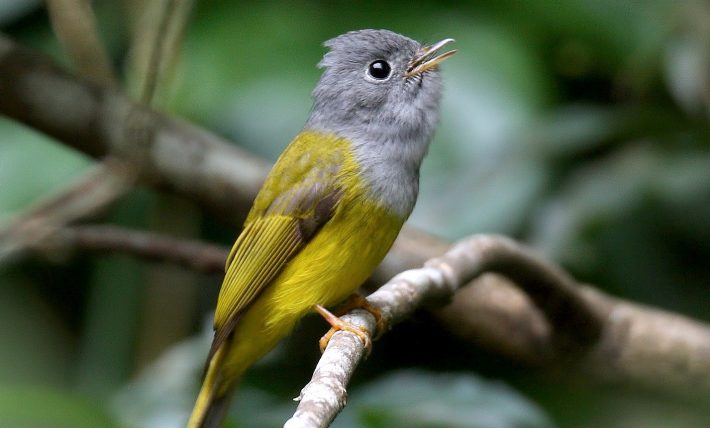Breeding songbirds alter their singing behaviour in selectively logged tropical forests
Author press release.
University of Florida researchers working in Malaysian Borneo are learning that songbirds change how they sing in tropical forests degraded by selective logging. Published in Journal Applied Ecology.

Dr. Rajeev Pillay, formerly a Ph.D. Candidate in Wildlife Ecology and Conservation, is among the biologists worldwide who are concerned about the effects of selective logging on tropical biodiversity.
His research, based on two years of field study in Sabah, focuses on singing behaviour in birds. Birds sing during the breeding season to attract mates and defend their territories from competitors. The song rate of individual male songbirds (i.e. the number of songs produced by a male per unit time) conveys information to females of the same species on the quality of the territory held by a male.
In a study slated for publication this month in the Journal of Applied Ecology, Dr. Pillay and his collaborators from UF’s WEC and the Institute for Tropical Biology and Conservation at Universiti Malaysia Sabah – Robert Fletcher, Kathryn Sieving, Bradley Udell and Henry Bernard – demonstrate that breeding songbirds in Borneo alter their song rates with selective logging.
In the paper titled “Bioacoustic monitoring reveals shifts in breeding songbird populations and singing behaviour with selective logging in tropical forests”, Dr. Pillay and colleagues present data gathered with acoustic technology to show that songbird species that showed smaller populations in logged forests (relative to unlogged forests) also produced fewer songs per individual. Conversely, species that showed larger populations in logged forests also produced more songs per individual.
The researchers then demonstrate that species with known preferences for undisturbed habitats (i.e. the species most vulnerable to human disturbances) were the ones to respond most negatively to logging in singing behaviour. Conversely, species known to exploit habitats degraded by human activity were the ones to respond positively to logging in singing behaviour.
The researchers suggest that these observed patterns of change in the song rates of individual breeding birds are consistent with potential changes in territory quality with selective logging, with species experiencing either degraded or enhanced territory quality in logged forests, depending on their habitat preferences.
Read the article for free here:
Pillay, R., Fletcher, R.J., Sieving, K.E., Udell, B.J., Bernard, H. (2019) Bioacoustic monitoring reveals shifts in breeding songbird populations and singing behaviour with selective logging in tropical forests. Journal of Applied Ecology. doi: 10.1111/1365-2664.13492
Media Contact:
Rajeev Pillay rajeev.p20a@gmail.com or Robert J. Fletcher Jr. robert.fletcher@ufl.edu, 352-846-0632
Like what we stand for?
Support our mission and help develop the next generation of ecologists by donating to the British Ecological Society.